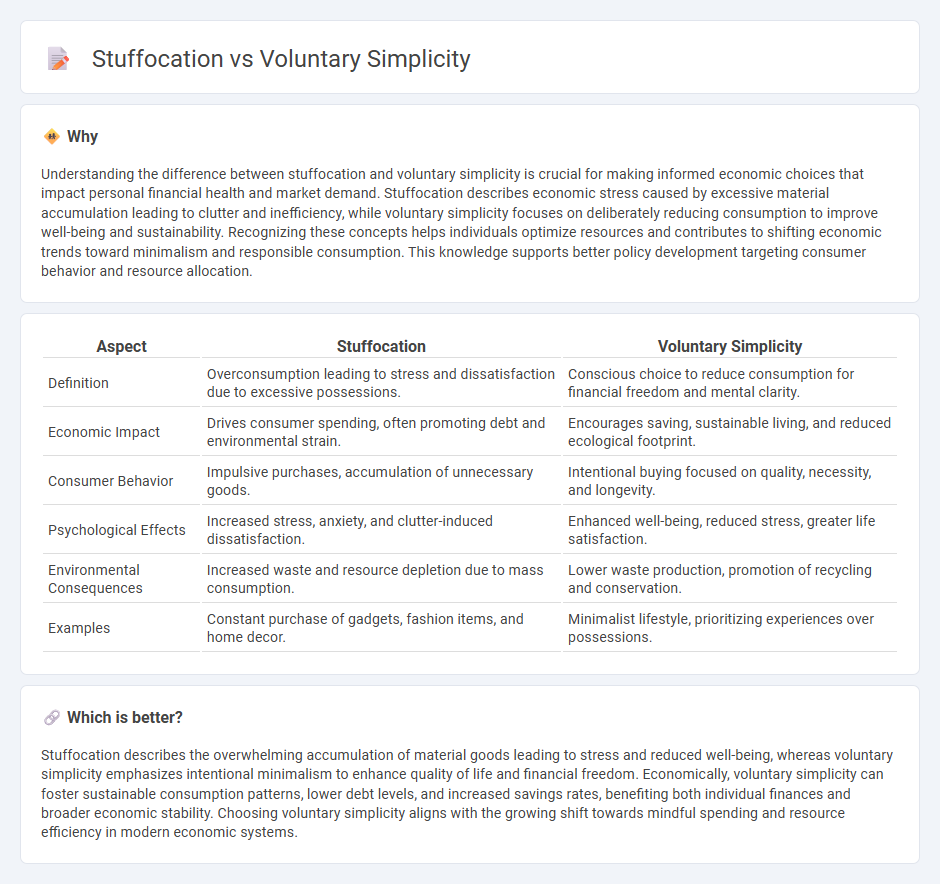
Stuffocation describes the stress and dissatisfaction from excessive material possessions in modern economies driven by consumerism, while voluntary simplicity advocates reducing consumption to enhance well-being and sustainability. Economic analyses link stuffocation to increased debt levels and environmental degradation, contrasting with voluntary simplicity's promotion of financial prudence and reduced ecological footprints. Explore further to understand how these contrasting lifestyle choices influence economic behavior and societal well-being.
Why it is important
Understanding the difference between stuffocation and voluntary simplicity is crucial for making informed economic choices that impact personal financial health and market demand. Stuffocation describes economic stress caused by excessive material accumulation leading to clutter and inefficiency, while voluntary simplicity focuses on deliberately reducing consumption to improve well-being and sustainability. Recognizing these concepts helps individuals optimize resources and contributes to shifting economic trends toward minimalism and responsible consumption. This knowledge supports better policy development targeting consumer behavior and resource allocation.
Comparison Table
| Aspect | Stuffocation | Voluntary Simplicity |
|---|---|---|
| Definition | Overconsumption leading to stress and dissatisfaction due to excessive possessions. | Conscious choice to reduce consumption for financial freedom and mental clarity. |
| Economic Impact | Drives consumer spending, often promoting debt and environmental strain. | Encourages saving, sustainable living, and reduced ecological footprint. |
| Consumer Behavior | Impulsive purchases, accumulation of unnecessary goods. | Intentional buying focused on quality, necessity, and longevity. |
| Psychological Effects | Increased stress, anxiety, and clutter-induced dissatisfaction. | Enhanced well-being, reduced stress, greater life satisfaction. |
| Environmental Consequences | Increased waste and resource depletion due to mass consumption. | Lower waste production, promotion of recycling and conservation. |
| Examples | Constant purchase of gadgets, fashion items, and home decor. | Minimalist lifestyle, prioritizing experiences over possessions. |
Which is better?
Stuffocation describes the overwhelming accumulation of material goods leading to stress and reduced well-being, whereas voluntary simplicity emphasizes intentional minimalism to enhance quality of life and financial freedom. Economically, voluntary simplicity can foster sustainable consumption patterns, lower debt levels, and increased savings rates, benefiting both individual finances and broader economic stability. Choosing voluntary simplicity aligns with the growing shift towards mindful spending and resource efficiency in modern economic systems.
Connection
Stuffocation, characterized by an overwhelming abundance of goods leading to consumer dissatisfaction, drives many individuals toward voluntary simplicity, a lifestyle choice focusing on minimalism and reduced consumption. The economic impact of this shift includes decreased demand for non-essential products and increased interest in sustainable, durable goods, influencing market trends and encouraging businesses to adopt eco-friendly practices. This connection highlights a growing consumer preference for quality over quantity, reshaping production and consumption patterns in modern economies.
Key Terms
Minimalism
Minimalism emphasizes intentional living by reducing material possessions to create more meaningful experiences and mental clarity, contrasting with stuffocation, which describes the overwhelming stress caused by excessive clutter and consumerism. Voluntary simplicity promotes conscious consumption and prioritizes quality over quantity to enhance well-being and sustainability. Explore how adopting minimalism can transform your lifestyle and reduce the burden of stuffocation.
Consumerism
Voluntary simplicity emphasizes mindful consumption, encouraging individuals to reduce material possessions and prioritize meaningful experiences over accumulating goods, thereby challenging consumerism's cycle of excess. Stuffocation describes the overwhelming stress caused by excessive belongings, highlighting how consumerism fosters clutter and dissatisfaction rather than fulfillment. Explore how shifting from consumerism to intentional living can improve well-being and environmental sustainability.
Sustainability
Voluntary simplicity emphasizes reducing material possessions and consumption to minimize environmental impact and promote sustainable living. Stuffocation highlights the negative effects of excessive consumerism and clutter, which contribute to resource depletion and ecological imbalance. Explore how adopting eco-friendly habits can enhance sustainability and improve quality of life.
Source and External Links
Voluntary Simplicity: Listening to the Quiet Revolution - Sloww - Voluntary simplicity is the ideology of working, wanting, and spending less in order to gain greater happiness, rejecting consumerism in favor of personal fulfillment and meaningful experiences.
What is Voluntary Simplicity? - Voluntary simplicity is a lifestyle that emphasizes consuming only what is sustainable and equitable, focusing on quality of life, relationships, and personal growth rather than material wealth or status.
Simple living - Wikipedia - Simple living involves reducing possessions, consumption, and dependence on technology and services, often motivated by personal, environmental, or financial reasons, and can lead to greater flexibility, less stress, and more time for creative or meaningful activities.
 dowidth.com
dowidth.com